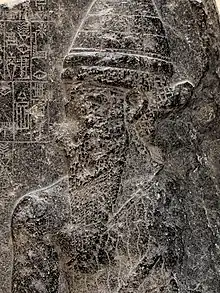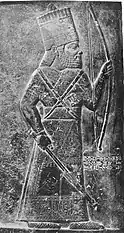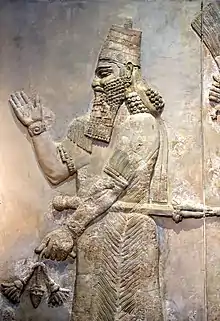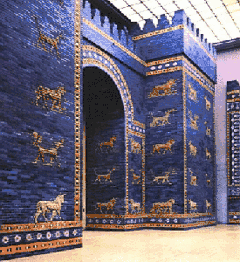List of Mesopotamian dynasties
The history of Mesopotamia extends from the Lower Paleolithic period until the establishment of the Caliphate in the late 7th century AD, after which the region came to be known as Iraq. This list covers dynasties and monarchs of Mesopotamia up until the fall of the Neo-Babylonian Empire in 539 BC, after which native Mesopotamian monarchs never again ruled the region.
The earliest records of writing are known from the Uruk period (or "Protoliterate period") in the 4th millennium BC, with documentation of actual historical events, and the ancient history of the region, being known from the middle of the third millennium BC onwards, alongside cuneiform records written by early kings. This period, known as the Early Dynastic Period, is typically subdivided into three: 2900–2750 BC (ED I), 2750–2600 BC (ED II) and 2600–2350 BC (ED III),[1] and was followed by Akkadian (~2350–2100 BC) and Neo-Sumerian (2112–2004 BC) periods, after which Mesopotamia was most often divided between Assyria in the north and Babylonia in the south. In 609 BC, after about a century of the kings of the Neo-Assyrian Empire ruling both Assyria and Babylonia, the Neo-Babylonian Empire destroyed Assyria and became the sole power in Mesopotamia. The conquest of Babylon by the Achaemenid Empire in 539 BC initiated centuries of Iranian rule (under the Achaemenid, Parthian and Sasanian empires), which was only briefly interrupted by the Hellenistic Argeads and Seleucids (331–141 BC) and the Roman Empire (AD 116–117).
This list follows the middle chronology, the most widely used chronology of Mesopotamian history.
Early dynastic period (c. 2900–2350 BC)
Before the rise of the Akkadian Empire in the 24th century BC, Mesopotamia was fragmented into a number of city states. Whereas some surviving Mesopotamian documents, such as the Sumerian King List, describe this period as one where there was only one legitimate king at any one given time, and kingship was transferred from city to city sequentially, the historical reality was that there were often many political leaders at any one given time.[2] The Sumerian King List is generally not regarded as historically reliable given the exaggerated reign lengths (some rulers are described as ruling for hundreds or even thousands of years) and the fact that out of the massive amount of pre-Akkadian rulers listed in the SKL, very few are actually attested in surviving evidence from the Early Dynastic period.[3] It is considered most appropriate by modern scholars to rely solely on actual Early Dynastic sources for reconstructing historical events during the Early Dynastic period.[4] As such, the table below only lists rulers whose existence is attested by other more contemporary sources.
Akkadian and Neo-Sumerian periods (c. 2334–2004 BC)
| Akkad | Gutium | Lagash | Uruk / Ur | ||||||||
| Name | Reign | Ref | Name | Reign | Ref | Name | Reign | Ref | Name | Reign | Ref |
|---|---|---|---|---|---|---|---|---|---|---|---|
| Sargonic dynasty | |||||||||||
| Sargon | c. 2334–2279 BC | [7] | |||||||||
| Rimush | c. 2278–2270 BC | [7] | |||||||||
| Manishtushu | c. 2269–2255 BC | [7] | Second dynasty of Lagash | ||||||||
| Naram-Sin | c. 2254–2218 BC | [7] | Gutian dynasty | Lugal-ushumgal | c. 2230–2210 BC | ||||||
| Shar-Kali-Sharri | c. 2217–2193 BC | [7] | Erridupizir | c. 2220–2202 BC | Puzer-Mama | around 2210 BC | Fourth dynasty of Uruk | ||||
| Imta | c. 2202–2199 BC | Ur-Ningirsu I | around 2200 BC | Ur-nigin | around 2200 BC | ||||||
| Pirig-me | around 2200 BC | Ur-gigir | around 2200 BC | ||||||||
| Inkishush | c. 2199–2195 BC | ||||||||||
| Igigi (non-dynastic) | c. 2193 BC | [7] | Sarlagab | c. 2195–2192 BC | Kuda | uncertain | |||||
| Imi (non-dynastic) | c. 2192 BC | [7] | Shulme | c. 2192–2186 BC | Lu-Baba | uncertain | Puzur-ili | uncertain | |||
| Nanum (non-dynastic) | c. 2191 BC | [7] | |||||||||
| Ilulu (non-dynastic) | c. 2190 BC | [7] | Lugula | uncertain | Ur-Utu | uncertain | |||||
| Dudu | c. 2189–2169 BC | [7] | Elulmesh | c. 2186–2180 BC | |||||||
| Inimabakesh | c. 2180–2175 BC | ||||||||||
| Igeshaush | c. 2175–2169 BC | Kaku | uncertain | ||||||||
| Shu-turul | c. 2168–2154 BC | [7] | Yarlagab | c. 2169–2154 BC | |||||||
| Akkad defeated by the Gutians | |||||||||||
| Ibate | c. 2154–2151 BC | Ur-Baba | c. 2157–2144 BC | ||||||||
| Yarla | c. 2151–2148 BC | ||||||||||
| Kurum | c. 2148–2147 BC | ||||||||||
| Apilkin | c. 2147–2144 BC | ||||||||||
| La-erabum | c. 2144–2142 BC | Gudea | c. 2144–2124 BC | ||||||||
| Irarum | c. 2142–2140 BC | ||||||||||
| Ibranum | c. 2140–2139 BC | ||||||||||
| Hablum | c. 2139–2137 BC | ||||||||||
| Puzur-Suen | c. 2137–2130 BC | ||||||||||
| Yarlaganda | c. 2130–2123 BC | ||||||||||
| Si'um | c. 2123–2116 BC | Ur-Ningirsu II | c. 2124–2119 BC | Fifth dynasty of Uruk | |||||||
| Tirigan | c. 2116 BC | Ur-gar | c. 2117–2113 BC | Utu-hengal | c. 2119–2113 BC | ||||||
| Gutians defeated by Utu-Hengal of Uruk | Third dynasty of Ur | ||||||||||
| Nam-mahani | c. 2113–2110 BC | Ur-Nammu | c. 2112–2095 BC | [8] | |||||||
| Lagash defeated by Ur-Nammu of Ur | Shulgi | c. 2094–2047 BC | [8] | ||||||||
| Amar-Sin | c. 2046–2038 BC | [8] | |||||||||
| Shu-Sin | c. 2037–2029 BC | [8] | |||||||||
| Ibbi-Sin | c. 2028–2004 BC | [8] | |||||||||
Isin–Larsa and rise of Babylon (c. 2025–1750 BC)
| Southern Mesopotamia | Northern Mesopotamia | ||||||||||||||||
| Isin | Larsa | Babylon | Uruk | Eshnunna | Assyria | ||||||||||||
| Name | Reign | Ref | Name | Reign | Ref | Name | Reign | Ref | Name | Reign | Ref | Name | Reign | Ref | Name | Reign | Ref |
|---|---|---|---|---|---|---|---|---|---|---|---|---|---|---|---|---|---|
| First dynasty of Isin | Dynasty of Larsa | Dynasty of Eshnunna | Puzur-Ashur dynasty | ||||||||||||||
| Ishbi-Erra | c. 2017–1985 BC | [8] | Naplanum | c. 2025–2005 BC | [8] | Ituria | uncertain | [9] | Puzur-Ashur I[lower-alpha 1] | uncertain | [10] | ||||||
| Emisum | c. 2004–1977 BC | [8] | Ilushuilia | uncertain | [9] | Shalim-ahum | uncertain | [10] | |||||||||
| Shu-Ilishu | c. 1984–1975 BC | [8] | Nurakhum | uncertain | [9] | Ilu-shuma | uncertain | [10] | |||||||||
| Iddin-Dagan | c. 1974–1954 BC | [8] | Samium | c. 1976–1942 BC | [8] | Kirikiri | uncertain | [9] | Erishum I | c. 1974–1935 BC | [10] | ||||||
| Ishme-Dagan | c. 1953–1935 BC | [8] | Zabaia | c. 1941–1933 BC | [8] | Bilalama | uncertain | [9] | |||||||||
| Lipit-Eshtar | c. 1934–1924 BC | [8] | Gungunum | c. 1932–1906 BC | [8] | Azuzum | uncertain | [9] | Ikunum | c. 1934–1921 BC | [10] | ||||||
| Ur-Ninurta | c. 1923–1896 BC | [8] | Abisare | c. 1905–1895 BC | [8] | Amorite dynasty (Dynasty I) | Ipiq-Adad I | uncertain | [9] | Sargon I | c. 1920–1881 BC | [10] | |||||
| Bur-Suen | c. 1895–1874 BC | [8] | Sumuel | c. 1894–1866 BC | [8] | Sumu-abum | c. 1894–1881 BC | [11] | Shiqlanum | uncertain | [9] | ||||||
| Lipit-Enlil | c. 1873–1869 BC | [8] | Abdi-Erah | uncertain | [9] | Puzur-Ashur II | c. 1880–1873 BC | [10] | |||||||||
| Erra-imitti | c. 1868–1861 BC | [8] | Nur-Adad | c. 1865–1850 BC | [8] | Sumu-la-El | c. 1880–1845 BC | [11] | Sixth dynasty of Uruk | Belakum | uncertain | [9] | |||||
| Enlil-bani | c. 1860–1837 BC | [8] | Sin-Iddinam | c. 1849–1843 BC | [8] | Sin-kashid | uncertain | [12] | Warassa | uncertain | [9] | Naram-Sin | c. 1872–1829 BC | [10] | |||
| Zambiya | c. 1836–1834 BC | [8] | Sin-Eribam | c. 1842–1841 BC | [8] | Sabium | c. 1844–1831 BC | [11] | Sin-eribam | uncertain | [12] | Ibal-pi-El I | uncertain | [9] | |||
| Iter-pisha | c. 1833–1831 BC | [8] | Sin-Iqisham | c. 1840–1836 BC | [8] | Sin-gamil | uncertain | [12] | Ipiq-Adad II | uncertain | [9] | ||||||
| Silli-Adad | c. 1835 BC | [8] | Anam | uncertain | [12] | Naram-Sin | uncertain | [9] | |||||||||
| Ur-du-kuga | c. 1830–1828 BC | [8] | Warad-Sin | c. 1834–1823 BC | [13] | Irdanene | uncertain | [12] | Dadusha | uncertain | [9] | ||||||
| Suen-magir | c. 1827–1817 BC | [8] | Rim-Sin I[lower-alpha 2] | c. 1822–1763 BC | [13] | Apil-Sin | c. 1830–1813 BC | [11] | Rim-Anum | uncertain | [12] | Ibal-pi-El II | c. 1762 BC | [9] | Erishum II | c. 1828–1809 BC | [10] |
| Shamshi-Adad dynasty | |||||||||||||||||
| Damiq-ilishu | c. 1816–1794 BC | [8] | Sin-Muballit | c. 1812–1793 BC | [11] | Nabi-ilishu | c. 1802 BC | [12] | Shamshi-Adad I | c. 1808–1776 BC | [10] | ||||||
| Isin defeated by Rim-Sin I of Larsa | |||||||||||||||||
| Hammurabi | c. 1792–1750 BC | [11] | Uruk defeated by Hammurabi of Babylon | Eshnunna defeated by Siwepalarhuhpak of Elam | Ishme-Dagan I | c. 1775–1735 BC | [10] | ||||||||||
| Larsa defeated by Hammurabi of Babylon | |||||||||||||||||
Fragmentation of Babylonia (c. 1749–1475 BC)
| Southern Mesopotamia (Babylonia) | Northern Mesopotamia | ||||||||||
| Babylon | Kassites | Sealand | Assyria | ||||||||
| Name | Reign | Ref | Name | Reign | Ref | Name | Reign | Ref | Name | Reign | Ref |
|---|---|---|---|---|---|---|---|---|---|---|---|
| Amorite dynasty (Dynasty I; continued) | Kassite dynasty (Dynasty III) | First Sealand dynasty (Dynasty II) | Shamshi-Adad dynasty (continued) | ||||||||
| Samsu-iluna | c. 1749–1712 BC | [11] | Gandash | c. 1729–1704 BC | [14] | Ilum-ma-ili | c. 1725–? BC | [15] | Mut-Ashkur | uncertain | [16] |
| Rimush | uncertain | [16] | |||||||||
| Abi-Eshuh | c. 1711–1684 BC | [11] | Agum I | c. 1703–1682 BC | [14] | Itti-ili-nibi | uncertain | [15] | Asinum | uncertain | [16] |
| Seven usurpers | |||||||||||
| Ashur-dugul | uncertain | [16] | |||||||||
| Ashur-apla-idi | [16] | ||||||||||
| Nasir-Sin | [16] | ||||||||||
| Sin-namir | [16] | ||||||||||
| Ipqi-Ishtar | [16] | ||||||||||
| Adad-salulu | [16] | ||||||||||
| Adasi | [16] | ||||||||||
| Adaside dynasty | |||||||||||
| Damqi-ilishu | uncertain | [15] | Bel-bani | c. 1700–1691 BC | [16] | ||||||
| Kashtiliash I | c. 1681–1660 BC | [14] | Libaya | c. 1691–1674 BC | [16] | ||||||
| Ammi-Ditana | c. 1683–1647 BC | [11] | Abi-Rattash | uncertain | [17] | Ishkibal | uncertain | [15] | Sharma-Adad I | c. 1673–1662 BC | [16] |
| Iptar-Sin | c. 1661–1650 BC | [16] | |||||||||
| Ammi-Saduqa | c. 1646–1626 BC | [11] | Shushushi | uncertain | [15] | Bazaya | c. 1649–1622 BC | [16] | |||
| Samsu-Ditana | c. 1625–1595 BC | [11] | Kashtiliash II | uncertain | [17] | Gulkishar | uncertain | [15] | Lullaya | c. 1621–1616 BC | [16] |
| Shu-Ninua | c. 1615–1602 BC | [16] | |||||||||
| Sharma-Adad II | c. 1601–1598 BC | [16] | |||||||||
| Babylon destroyed by the Hittites | Urzigurumash | uncertain | [17] | Peshgaldaramesh | c. 1599–1549 BC | [15] | Erishum III | c. 1598–1586 BC | [16] | ||
| Agum II | uncertain | [17] | Shamshi-Adad II | c. 1585–1580 BC | [16] | ||||||
| Harba-Shipak | uncertain | [17] | Ishme-Dagan II | c. 1580–1564 BC | [16] | ||||||
| Kassite dynasty (Dynasty III) | Shipta'ulzi | uncertain | [17] | Shamshi-Adad III | c. 1564–1548 BC | [16] | |||||
| Burnaburiash I[lower-alpha 3] | c. 1530–1500 BC | [18] | Burnaburiash I | c. 1530–1500 BC | [18] | Ayadaragalama | c. 1548–1520 BC | [15] | Ashur-nirari I | c. 1548–1522 BC | [16] |
| Akurduana | c. 1519–1493 BC | [15] | Puzur-Ashur III | c. 1522–1498 BC | [16] | ||||||
| Ulamburiash | around 1475 BC | [17] | Ulamburiash | around 1475 BC | [17] | Melamkurkurra | c. 1592–1485 BC | [15] | Enlil-nasir I | c. 1498–1485 BC | [16] |
| Ea-gamil | c. 1484–1475 BC | [15] | Nur-ili | c. 1485–1473 BC | [16] | ||||||
Babylonia and rising Assyria (c. 1475–539 BC)
See also
Notes
- Considered the first king of the Old Assyrian period
- Rim-Sin I was the last independent king of Larsa, though the city rebelled against Hammurabi's successor Samsu-iluna in 1737, with Rim-Sin II briefly ruling there as king.
- The earliest Kassite ruler confidently attested as ruling Babylon itself.
- Reunified Babylonia through defeating Ea-gamil, the last king of the First Sealand dynasty
- Considered the first king of the Middle Assyrian period
- Considered the first king of the Neo-Assyrian Empire
- Sometimes assigned to his own dynasty, the "Shapi dynasty"
- Sometimes assigned to his own dynasty, the "Third Sealand dynasty"
- Assigned to the earlier Dynasty of E in king-lists
References
- "Early Dynastic Period (Mesopotamia)".
- Marchesi 2010, p. 234.
- Marchesi 2010, pp. 236–237.
- Marchesi 2010, p. 238.
- Beaulieu 2018, p. 36.
- Crawford 2013, p. xxiii.
- Crawford 2013, p. xxiv.
- Oppenheim 1977, p. 336.
- Roaf 1996, p. 111.
- Chen 2020, pp. 197–201.
- Chen 2020, pp. 202–206; Beaulieu 2018, p. 69.
- Roaf 1996, p. 110.
- Oppenheim 1977, p. 337.
- Chen 2020, pp. 202–206; Beaulieu 2018, p. 126; Murai 1979, p. 6.
- Chen 2020, pp. 202–206; Beaulieu 2018, pp. 129–130.
- Assyrian King List; Ancient Egypt and Archaeology.
- Chen 2020, pp. 202–206; Beaulieu 2018, p. 126.
- Chen 2020, pp. 202–206; Beaulieu 2018, p. 126; Leick 2003, p. 142.
- Assyrian King List; Kuhrt 1995, p. 351.
- Beaulieu 2018, p. 155.
- Beaulieu 2018, pp. 176–178.
- Beaulieu 2018, p. 178.
- Beaulieu 2018, p. 195.
- Beaulieu 2018, p. 220.
Bibliography
- Beaulieu, Paul-Alain (2018). A History of Babylon, 2200 BC - AD 75. Pondicherry: Wiley. ISBN 978-1405188999.
- Chen, Fei (2020). Study on the Synchronistic King List from Ashur. Leiden: BRILL. ISBN 978-9004430914.
- Crawford, Harriet (2013). The Sumerian World. Routledge. ISBN 978-0415569675.
- Kuhrt, Amélie (1995). The Ancient Near East, C. 3000-330 BC, Volume 1. Routledge. ISBN 0-415-01353-4.
- Leick, Gwendolyn (2003). Historical Dictionary of Mesopotamia. Lanham: The Scarecrow Press. ISBN 978-0810846494.
- Marchesi, Gianni (2010). "The Sumerian King List and the Early History of Mesopotamia". Ana turri gimilli: Studi dedicati al Padre Werner R. Mayer, S. J., da amici e allievi.
- Murai, Nobuaki (1979). Studies in the aklu Documents of the Middle Babylonian Period (PhD thesis). Leiden University.
- Oppenheim, A. Leo (1977). Reiner, Erica (ed.). Ancient Mesopotamia: Portrait of a Dead Civilization (Revised ed.). University of Chicago Press. ISBN 978-0226631875.
- Roaf, Michael (1996). Cultural Atlas of Mesopotamia and the Ancient Near East. New York: Facts on File Inc. ISBN 0-8160-2218-6.
Web sources
- "Ancient Egypt and Archaeology Web Site - Ancient Egypt - Assyrian". www.ancient-egypt.co.uk. Retrieved 2019-11-13.
- "The Assyrian King List - Livius". www.livius.org. Retrieved 2 April 2019.





